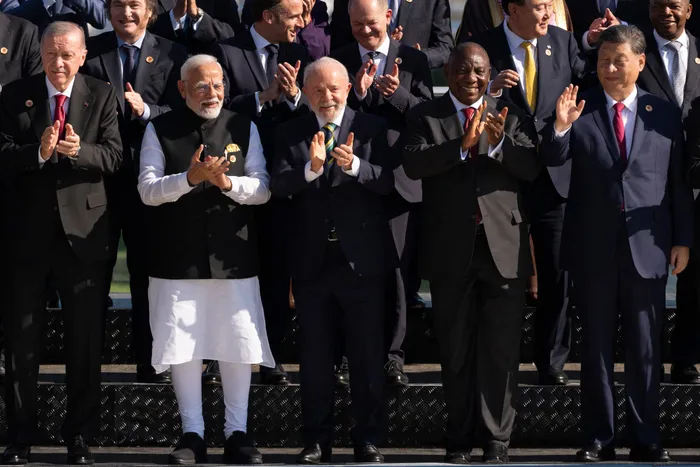G20 summit begins in Rio with a focus on global action against poverty, hunger and climate change

(From left to right) Turkish President Recep Tayyip Erdogan, Indian Prime Minister Narendra Modi, Brazilian President Luiz Inacio Lula da Silva, South African President Cyril Ramaphosa, and Chinese President Xi Jinping join G20 leaders for a group photo at the G20 Summit in Rio de Janeiro, Brazil, on November 18, 2024. Picture: Manuel Balce Cenetac/ AFP.
Abdul Rahman
The two-day summit of the G20 countries began on Monday, November 18 at the Museum of Modern Art in Rio De Janeiro, Brazil. The summit is expected to discuss common global problems of war, poverty and hunger, threats of climate change, and announce measures to deal with them.
All heads of member states except Russian President Vladimir Putin are expected to join Brazilian President Luiz Inácio Lula da Silva in the deliberations on Monday and Tuesday.
G20, or Group of 20, formed as an intergovernmental forum in 1999. Its first summit was held in 2008. It has a membership representing world’s leading economies, both developed and developing, including the US, China, Japan, Germany, the UK, India, France, Italy, Australia, Mexico, South Korea, Canada, Russia, Saudi Arabia, Argentina, Indonesia, South Africa, Turkey, and Brazil. The European Union (EU) and African Union (AU) are also members of the grouping.
According to the Brazilian Sherpa of the G20 this year, ambassador Mauricio Lyrio, the central agenda of this year’s summit would be social inclusion, reform of international institutions, and energy transition. Brazil is set to launch a “global alliance against hunger and poverty” to fight global hunger and poverty by 2030.
Lyrio underlined earlier this month that Brazil believes peace is a pressing necessity in order for the world to use its political and financial resources to fight poverty and hunger and to promote sustainable development, the highest goals of the international community.
Brazil has proposed to contribute half of the funds needed to run the infrastructure of the global alliance on hunger until 2030.
According to this year’s “the state of food security and nutrition in the world report,” published jointly by the World Food Program (WFP) and several other organizations, over 733 million people across the world face hunger today. Most of these people live in poor and developing countries in Africa, Asia, and Latin America, and need urgent international support to achieve zero hunger as per the UN sponsored Sustainable Development goals by 2030.
Mexican President Claudia Sheinbaum traveled to Rio to participate in her first international summit as head of state and emphasized the importance of united action to stop climate change. She called on global leaders to contribute to a fund for a program “Sowing Life”, seeking to be the largest global reforestation program which would “mitigate global warming and reduce poverty. The proposal is to stop sowing wars; let us sow peace and sow life,” she said on Monday.
Reforms in global institutions
The G20 meeting is taking place at a peak time for meetings of international bodies. On the eve of the G20 heads of state meeting, the leaders of world’s leading economies, the US and China, participated in the Asia-Pacific Economic Forum (APEC) summit on Saturday in Lima, Peru. It was considered significant in order to address the possible anxieties among the members of the G20 and other international forums following the election of Donald Trump as the new president of the US earlier this month. During the meeting both the countries “reaffirmed their commitment to maintaining dialogue, fostering cooperation and steering clear of conflict,” Xinhua reported.
The election of Donald Trump as president of the US has cast doubts about the future of global climate action as well as the practicality of the G20 agenda this year. Trump is generally considered hostile to multilateral platforms, international regimes, and united actions. He had pursued unilateral policies often antithetical to international norms and institutions in his previous term as president between 2016-2020.
The developing economies and particularly members of BRICS are expected to push for reforms in the international institutions, including the UN and international financial institutions such as the IMF, World Bank and the World Trade Organization (WTO) as a major agenda. BRICS, during its summit in Kazan, Russia last month adopted a declaration setting it as a priority to make these institutions reflect the changing reality of world politics. Reforms may make them more efficient as well, they expressed in the Kazan declaration.
The G20 summit is also happening simultaneously with COP29 which is ongoing in Baku, Azerbaijan. At Baku issues of climate financing have emerged as the central theme and are expected to dominate the G20 meetings as well.
Developing countries in the ongoing COP29 have insisted on increased finance from the developed countries, to the level of a trillion dollars per year, to execute their green development projects as well as mitigation measures and relief.
UN Secretary General Antonio Guterres speaking to the press on the eve of the summit on Sunday asked the G20 countries to “lead” the world to address “fundamental common challenges” such as climate crisis, conflicts across the world, hunger and poverty, growing inequality. He pointed out that “the developed countries must support emerging economies and developing countries-with technology and finance” to tackle the climate issues.
* This article was originally published in https://peoplesdispatch.org/
** The views expressed in this article do not necessarily reflect the views of The African.